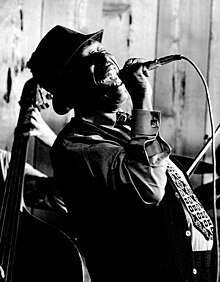Eddie Jefferson
Edward "Eddie" Jefferson (born August 3, 1918 in Pittsburgh , † May 9, 1979 in Detroit ) was an American jazz singer who is considered the founder of the Vocalese style, as well as songwriter .
Live and act
Jefferson learned to play the guitar, tuba and drums, began tap dancing with his brother at the age of eight and initially played in his father's band and with vocal groups, e.g. B. at the world exhibition in Chicago in 1933 . He began as a tap dancer, best known in 1939 with appearances in Coleman Hawkins' band , in which he danced hits by soloists in the Count Basie Orchestra (such as Lester Young , Herschel Evans ). In 1946 he continued his career as a dancer and danced z. B. 1950 in the duo "Billie and Eddie" with performances by Sarah Vaughan . At the end of the 1940s he also drew attention to himself through his singing. His vocalese art (in which the playing of jazz instruments is vocally imitated) first appeared on record in 1951 (" Body and Soul " based on the version by Coleman Hawkins, but also live recordings from 1949 were released by Spotlite). King Pleasure landed a hit in 1952 with his text for "In the Mood for Love" . The bassist King Pleasure heard him in Cincinnati and imitated him in New York, but readily admitted that Jefferson was his source, which also helped Jefferson make recordings (as he later gratefully recalled).
According to Jefferson's own words, other hits from Jefferson were "Parker's Mood" (also a hit for King Pleasure) and "Filthy McNasty". 1953 to 1957 and 1968 to 1973 he was the singer and manager of James Moody . At the end of the 1960s he was rediscovered and z. B. 1969 at the Newport Jazz Festival , brought out new records in the 1970s, like 1974 Things Are Getting Better on Muse . While his voice quickly appeared thin and stretched in the beginning, it gained stature in later years, according to Will Friedwald . In 1976 he appeared with Jon Hendricks and Annie Ross and in 1979 with Sarah Vaughan and Betty Carter . Jefferson wrote lyrics and interpretations of numerous jazz standards from " Honeysuckle Rose ", " So What " to "Bitches Brew". He converted the text of Pennies from Heaven into a parody in which a soldier returning home after years wondering about the unexpected offspring (“Benny's from Heaven”).
He made his last recordings during a performance in "Joe Segal's Jazz Showcase" in Chicago with alto saxophonist Richie Cole . Two days after this performance, after the opening performance in the traditional Detroit jazz club "Bakers Keyboard Lounge", he was shot out of a car while leaving the club at half past one in the morning. The driver was later identified as the dancer Jefferson once fired from his show. However, the evidence was insufficient for a conviction. Shortly before his death, Manhattan Transfer commissioned him with a text for "Birdland".
Discographic notes
- Letter from Home (Riverside / OJC, 1961)
- Body and Soul (Prestige / OJC 1968)
- Come Along with Me (Prestige / OJC, 1969)
- Godfather of Vocalese (Muse, 1976)
- Still on the Planet (Muse, 1976)
- The Live-Liest (Muse, 1979)
literature
- Martin Kunzler : Jazz Lexicon . Reinbek, Rowohlt.
- Will Friedwald: Swinging Voices of America - A Compendium of Great Voices . Hannibal, St. Andrä-WIERT, 1992. ISBN 3-85445-075-3 .
Web links
- All Music Guide
- Recordings of Jefferson
- Selection discography
- Jefferson's lyrics to "In the Mood for Love"
| personal data | |
|---|---|
| SURNAME | Jefferson, Eddie |
| ALTERNATIVE NAMES | Jefferson, Edward |
| BRIEF DESCRIPTION | American jazz singer and songwriter |
| DATE OF BIRTH | August 3, 1918 |
| PLACE OF BIRTH | Pittsburgh |
| DATE OF DEATH | May 9, 1979 |
| Place of death | Detroit |
